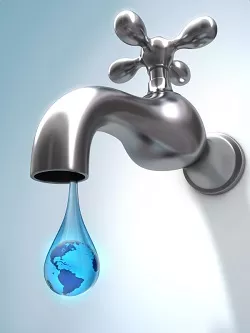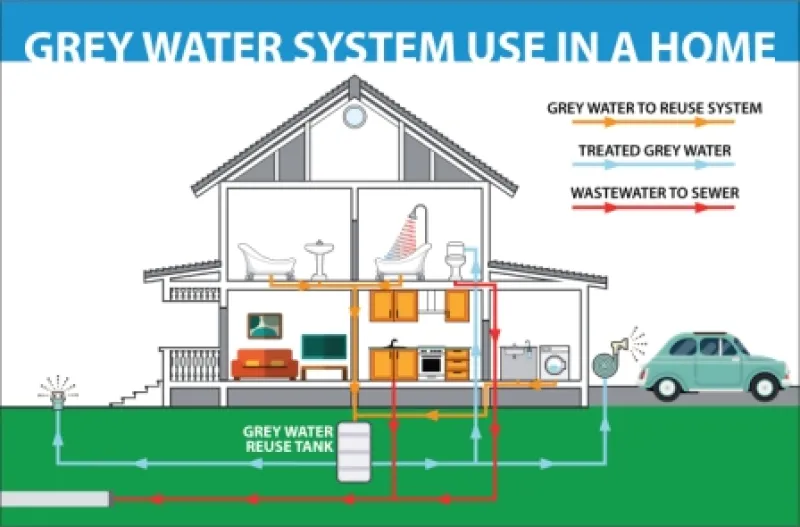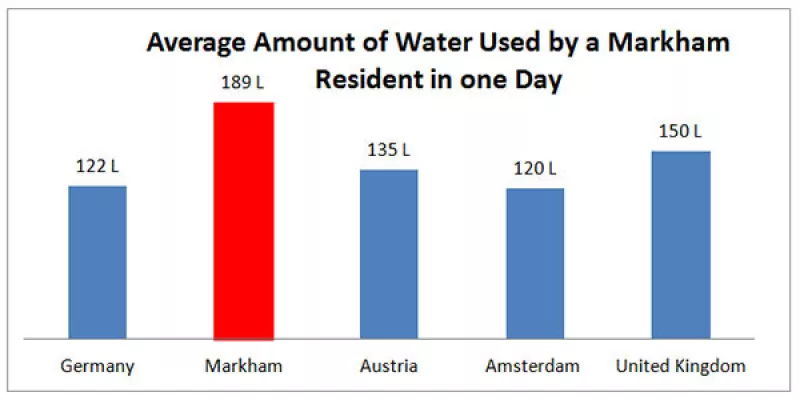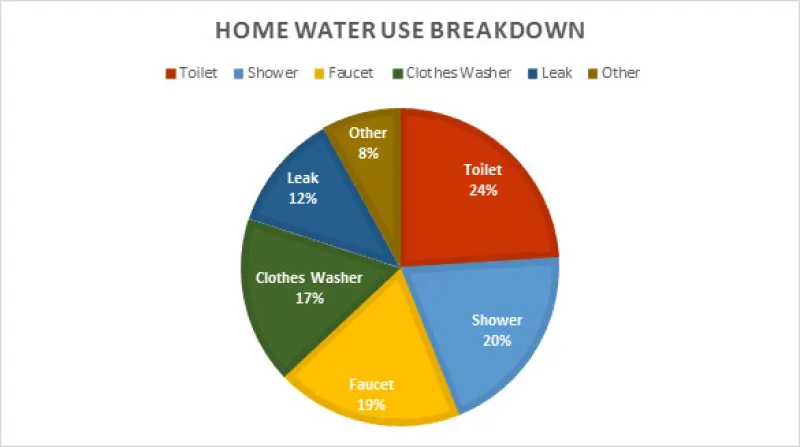How to Use Less Water

The City of Markham wants everyone to use water efficiently!
There are easy ways to reduce the amount of water you use. Find out how much water you're using, and learn how we can all use less water.
Save water outdoors and learn how to safely drain pools, spas and hot tubs.
Water use changes with the seasons. People use more water in the summer, but some of this water is wasted. Your summer water bills are probably higher than others but we have some tips to help you manage your outdoor water use.
- Summer Water Restrictions
What You Need to Know About the By-law
The City of Markham limits outdoor water use in the summer. These limits happen between June 1 and September 30 every year. They apply to all residential owners, tenants, and lessees.
Here are the rules:
- The City of Markham limits when you can use municipally-supplied drinking water to water your lawns, gardens, trees, and shrubs.
- Outdoor watering on residential properties is allowed between 6 to 9 AM or 6 to 9 PM, but not both.
- Properties with an even-numbered street address can water their lawns on even-numbered days during this time
- Properties with an odd-numbered street address can water their lawns on odd-numbered days during this time
- Properties with an even-numbered street address can water their lawns on even-numbered days during this time
Note: The City actively looks for people who aren’t following the water restrictions. Notices are handed out to residents that don't follow Water Use By-law 2019-53. Those in violation may be fined up to $5,000 upon conviction.
Why Are Summer Water Restrictions Needed?
During summer months, water use more than doubles. The City needs to make sure that it has enough water to meet demand. By reducing how much water we use during peak hours (10 AM to 5 PM) we can help our infrastructure last longer. It reduces construction, operation, and maintenance costs. It also helps us lower the cost of providing reliable and safe water to our community.
Summer Water Restrictions Help:
Reduce Infrastructure Demands
If we reduce the amount of water we use during peak hours (10 AM to 5 PM), we prolong the lifespan of our current infrastructure and helps manage operational costs.
Maintain a Reliable Water Supply
A reliable water supply helps ensure drinking water reserves, adequate water pressure, and fire protection. By reducing our use of treated water during peak hours, water will be there when we need it.
Support Environmental Sustainability
The water used outdoors from sprinklers, hoses, and driveway car washing runs off into storm sewers on your street. It can pick up all sorts of pollutants along the way. Contaminated water that goes into our storm sewers flows directly into Lake Ontario without being treated. Reducing outdoor water use can reduce the pollutants that end up in our drinking water source. Plants, wildlife, and aquatic animals need a clean lake, too!
Exemptions
There are some exemptions to Water Use By-law 2019-53
Properties with newly laid sod can use water for a period of 2 months after the sod is first laid.
Properties not connected to the municipal water supply don’t have to follow these water restrictions. However, we do encourage all property owners to be good environmental stewards and follow the water use restrictions.
- Automatic Irrigation Systems
You can water your lawn automatically! Choose a system and timer that lets you:
- Water parts of your property independently
- Program which days you water
- Increase or decrease the length of watering time
- Purchase a soil moisture sensor to monitor moisture levels to ensure optimal plant growth
- Purchase a rain sensor to automatically stop watering during rain periods
Irrigation System Tips:
- Change your settings on the irrigation controller to suit seasonal weather conditions. Over-watering is most common during the spring and fall.
- Water your property according to sun or shade exposure and soil type.
- Inspect your irrigation system for leaks, broken or clogged heads, and other problems.
- Ensure sprinkler heads are distributing water evenly.
- Never water driveways or other hard surfaces or structures.
- Do not cut your grass too short – shorter grass requires more water.
- Look for indicators that your lawn needs watering. These include grass turning a bluish-gray colour, dry soil and footprints remaining in the grass. When you water your property:
- When you water your property:
- Water early morning to reduce evaporation and avoid fungus growth and mould.
- Let the water soak in. If water puddles due to dry or compacted soil, stop watering and allow time for it to seep into the ground.
- Less is more. Watering too much and too often can cause plants to have shallow roots. This leads to weed growth, it attracts pests, and makes plants susceptible to disease or fungus.
- Gardening Tips
Create a vibrant landscape!
The amount of water you use can depend on the plants you have. Native plants are the best choice for landscaping. They grow in our region naturally and are adapted to the climate. You can save water by limiting the lawn area you keep green and weed free. Trees, shrubs, and ground cover absorb much more rainfall and don’t need as much maintenance as grass.
Put mulch around plantings to reduce evaporation. Another great tip is to groups plants with similar water needs around each other.
We don't encourage you to use pesticides, chemical treatments, or fertilizers. When landscapes are watered, or it rains, these chemicals can enter our storm sewers. This can pollute our fresh drinking water source.
Rain Gardens
Rain Gardens are a great way to manage storm water runoff. They can protect the water that flows into local streams, ponds, rivers, and lakes. A rain garden uses a depression in the landscape to collect water runoff. It uses loose, deep soil and native plant species that are drought and water tolerant. They let 30% more water penetrate into the ground than a normal lawn. You can visit a demonstration rain garden at the Markham Museum, or see other demonstration rain gardens in the region.
Maintaining a Healthy Lawn
(Courtesy of York Region)
Here are tips for keeping a healthy lawn:
- Aerate every other fall to limit soil compaction. This will increase water absorption and help to reduce thatch.
- Top dress every spring or fall with compost. Rake into the lawn half an inch deep.
- Over-seed every spring or fall with a grass seed high in fescue content (at least 60%) and low in Kentucky Blue content (20% at most).
- Fescue grasses have fine glades that are drought and disease resistant due to their deep rooting system.
- Kentucky Blue grass, which is the only grass found in sod, has the shallowest root system. It’s the weakest, most water dependent and most susceptible to disease.
- Your mowing height should be six centimetres to eight centimetres. This will shade roots and prevent weeds.
- Fertilize every fall with compost. This will give your lawn the nutrients it needs to make it through the winter.
For more tips watch the "Be Water Smart" - Lawn Maintenance Tips video.
- Rain Barrels
Disconnect Your Downspout and Collect the Rain
A rain barrel is a great way to lower your water bill and protect the sewer system. Rain barrels work by collecting rainwater from your downspout and rooftop and redirecting it to your lawn and garden instead!
Rain Barrel Tips
Purchasing:
- Rain barrels are available for purchase at your local hardware store such as Home Depot, RONA and Home Hardware.
- It’s best to choose a barrel that holds at least 200 liters.
- You barrel should have a mesh screen that covers the water entry to keep out mosquitoes and other pests.
Installation:
- Install your rain barrel on a strong, level surface. It can weigh up to 1,200 pounds when full! A patio or paving stone is best.
- Use an overflow hose to direct water into the garden or a grassed area where it will soak into the ground.
- Raise your barrel to create increased water pressure.
- Link multiple barrels together to hold more water.
Storage and Maintenance:
- Empty your rain barrel and bring it inside (or turn it over) before it freezes in the fall. Water left in the barrel over winter can crack the plastic walls.
Additional Resources
Check out this information sheet for more Rain Barrel tips!
Downspout Disconnection:
Check out these tips on how to disconnect a downspout
Home & Garden:
Create a naturally beautiful lawn and garden, here’s how:
- Get inspired using TRCA’s Home and Garden Resource Page
- Choose the right plants for your space using York Region’s Water-Efficient Plant Selection Guide
- Efficient Pools, Spas, and Hot Tubs
Splash and Save with These Easy Tips!
- Pay attention when filling your pool, spa, or hot tub to prevent over-flows or over-filling.
- Use covers to reduce water evaporation. Make sure your covers fit properly! You may also see lower energy bills since covers retain heat.
- Repair any leaks. They won’t fix themselves!
- Warmer water evaporates more quickly. Turn down the temperature!
- Try not to use fountains and waterfalls. These speed evaporation.
- Clean filters manually. The average backwash can use between 950 and 3,780 litres of water!
- Most people backwash more frequently than necessary. Some pool filters do not have to be backwashed at all. Take them apart and clean them out instead.
- Try to avoid water loss though excessive splashing.
- Maintain proper chemical levels and adequate circulation time. This will avoid the need to use a lot of make-up water or drainage.
Proper Drainage Tips
Closing your Pool or Disposing Water
Protect the environment and our community! Do not drain chlorinated water or salt water from your pools directly into a storm drain. Pools, hot tubs, and spas should always be drained properly. This water can hold substances harmful to our environment, pets and local wildlife.
Follow these tips:
- Do not add chemicals for 2 weeks before draining your pool, spa, or hot tub.
- Make sure you remove chemicals from the water before draining. (For example: If your pool uses chlorine, de-chlorinate it before cleaning)
- Drain onto your lawn.
Safe Disposal of Pool, Hot Tub or Spa Chemicals
Leftover or expired pool chemicals are considered household hazardous waste and must be taken to the Household Hazardous Waste Depot in Markham, or there are other drop-off locations in York Region.
- Outdoor Summer Chores
Save Water, Save Money!
Here are some helpful summer tips:- Cleaning your driveway with a garden hose wastes water. When cleaning your driveway or sidewalk, sweep away dirt with a broom. Rain will do the rest!
- Take your car to a commercial car wash! They may use up to 50% less water than washing your vehicle in your driveway. They also prevent chemicals and pollutants from going into our storm sewers.
- If you must wash your car at home, use a bucket and sponge. This can save about 300 litres of water per wash. That's enough water to do two full loads of laundry!
Markham is lucky to have access to fresh water - we shouldn't waste it!
Markham is lucky to have access to fresh water. But, we only have one source and share it with over 9 million people in Ontario and New York State. Water prices also keep going up. Being water efficient protects our environment. It keeps our drinking water supply safe for us and for future generations. It can also save you money!
Lower your water use by following the easy tips below.
- Labels to Look For
Look for WaterSense and Energy Star labels!
WaterSense® and ENERGY STAR® are labelling programs that help you choose water-efficient and energy-efficient fixtures and appliances. WaterSense and Energy Star products are tested by third-parties to measure efficiency, performance, and quality.
You’ll find faucets, showerheads, and toilets with the WaterSense label in local stores. For dishwashers and clothes washers, Energy Star is the current rating system. Some stores have their own efficiency labels. WaterSense and Energy Star are still the most reliable choice.
- Toilets
Toilets can be water wasters!
Older toilets (like those installed before 1994) can use between 13 to 20 litres of water per flush. An average person flushes the toilet 5 times per day. Replacing a high-volume toilet is one of the best ways to reduce water use and save money.
New toilets are very efficient. WaterSense guidelines make single flush toilets use only 4.8 litres or less. Dual flush toilets use 6 litres, with a reduced flush of 4.1 litres or less.
Never use the toilet as a garbage bin! Items can block your home's plumbing system and lead to costly repairs for both you and the City. Find out what goes where!
- Showers
Shorten Your Showers
Low-flow fixtures use higher pressure and much less water. Try replacing your showerheads to WaterSense low-flow showerheads. These showerheads use less than 7.6 litres per minute. They can save up to 60% of water while still holding strong water pressure. Efficient showerheads also reduce hot water use by 15%. This can save you money on your energy bill, too!
You should also shorten your showers to 5 to 7 minutes to limit water waste.
- Faucet Aerators
Slow the Flow!
One of the best ways to reduce water use at the tap is by installing an aerator. The aerator (the screw-on tip of the faucet nozzle) limits the flow rate of water from the faucet. A typical faucet releases about 9.5 litres of water per minute or more. Installing a low-cost WaterSense aerator can reduce water use to as little as 1.9 litres per minute.
Reducing flows also reduces hot water use. This leads to energy savings! Installing an aerator is simple and it doesn't cost much money. Retrofit all your faucets today!
- Washing Machines
Choose an Efficient Washing Machine
Older top loading washing machines can use between 150 to 250 litres of water per load. Wash your clothes in cold water when possible. This will lower the amount of energy used to heat your water.
New machines remove more water and cut down on drying time. This lowers your energy use. If you are going to buy an Energy Star clothes washer, look for a low Water Factor (WF). Water Factor measures water efficiency. The lower the number, the more efficient the appliance. The most common water-efficient clothes washer is the ENERGY STAR® qualified front-loading model.
Always run full loads and adjust the water level for load size. Many liquid laundry soaps are formulated for cold water cycles. They work just as well with cold water and save you money.
- Fill up Your Dishwasher
Fill up Your Dishwasher
It's easy to use a dishwasher efficiently. Be sure to scrape your plates into the Green Bin instead of rinsing them. Run full loads, and use the water/energy saving mode.
When buying a new dishwasher, think about buying a water-saving model. Energy Star dishwashers a use less than 16.1 litres of water per cycle.
Washing dishes by hand can use a lot of water if you leave the water running to rinse each item. Fill a sink with rinse water to prevent waste.
- Leaks
Stop Leaky Faucets
Slow drips add up fast and cost you money! One drop per second can waste up to 10,000 litres of water a year. Leaking faucets are often caused by a worn-out washer. Washers cost less than a dollar to replace. For more water savings, look for the WaterSense label when buying faucets and accessories. You can reduce water flow by 20% or more!
Leaking Toilets = Money Wasted
A leaking toilet could be costing you hundreds of dollars a year. They often go unnoticed, because you can’t see or hear the leak. A leaking toilet can waste 400 litres a day! Check for leaks by putting a few drops of food colouring in the toilet tank. If colour appears in the bowl after 15 to 30 minutes, you have a leak! Often, you can fix the leap by replacing the flapper in the tank.
You can fix leaks yourself using a repair guide, or you can hire a plumber. Alliance for Water Efficiency provides instructions and videos to help you get the job done.
- Humidifiers
Get a new, efficient humidifier
Your home's humidifier helps moisten dry indoor air. Humidifiers also help people with asthma to breathe more easily. They can reduce dry skin and irritation from dry air.
Did you know that a flow-through furnace humidifier can waste up to 190 litres of water every day? That's over $200 a year! There are models on the market that produce fewer than 10 litres of water a day. Look for water-efficient models when installing or replacing these units.
The best options are rotating disc humidifiers. These use textured discs to humidify furnace-heated air. These have high performance and low maintenance. There are no replacements parts, and little energy (4 Watts per Hour) or water is used.
Visit the Canada Mortgage and Housing Corporation website or Desert Spring Products to learn more.
- Grey Water Re-Use
Recycling Water
Re-use your greywater! Greywater is wastewater from:
- Bathroom sinks
- Bathtubs
- Showers
- Clothes washers
You can install gray water re-use systems in new or existing buildings. These systems collect grey water in a storage tank. It’s then filtered, purified, and sent to toilet fixtures. Toilet flushing uses about 30% of daily water use in the home. For toilets, greywater is a good substitute for clean drinking water. You can save a lot of water and money!

Other Tips to Save On Indoor Water Use
- Don't leave the tap running when rinsing vegetables or brushing teeth
- Never put water down the drain when there may be another use for it. Use it to water plants or for cleaning!
- Insulate your water pipes. You’ll get hot water faster and won't waste water while it heats up.
- Rinse your razor in the sink pre-filled with a small amount of water. Don't run the tap.
- Keep a water jug in the fridge. This way you won’t have to run the tap until the water is cold.
- Avoid flushing the toilet unnecessarily. It is for human waste only. All other items should be put in the garbage or recycled.
Let's start using water wisely!
Water use changes with the seasons. People use more water in the summer, but some of this water is wasted. Your summer water bills are probably higher than others but we have some tips to help you manage your outdoor water use.

On average, a Markham resident uses 195 litres of water per day. That's enough to fill a bathtub! People in countries with similar lifestyles, like Austria (135 litres) and Germany (122 litres), use much less water.
As our population grows, there is more stress on our water source and infrastructure. York region has set a goal of 150 litres of water per person, per day. With small improvements to our daily water use behaviours and careful planning, we can achieve this goal!
Learn more about York Region’s Long Term Water Conservation Strategy.
- Save Money
There are easy ways to save water! Fix leaks, install efficient appliances and fixtures, and make water-efficient landscapes around your home. York Region's publication Water Efficiency: An At Home Guide shows many ways to become more water efficient.
- What's Using All That Water?
Most water is used in the washroom. See the chart below to find out how you might be using your water.

Home Water Use Breakdown
- Toilet 24%
- Shower 20%
- Faucet 19%
- Clothes Washer 17%
- Leak 12%
- Other 8%
Source: Water Research Foundation, Residential End Uses of Water, Version 2. 2016.
- Home Water Calculator
Use this Water Calculator from Alliance for Water Efficiency to better understand your home water use. You’ll learn where you can save money!
Be Water Wise - Know How Much Water You Use
Unit
Amount of Water used
Typical automatic sprinkler system
Average 37 litres per minute
Toilet – 1 flush
About 6 to 13 litres
Swimming pool – 5 by 9 metres
About 50,000 litres
Shower – 5 minutes
Average 53 litres
Car wash in the driveway
About 440 litres
Dishwasher
30 litres per load
Clothes washer – older top loading
About 150 litres
Average Markham family of 4
Between 5,000 and 7,000 litres of water per week
Contact
8100 Warden Avenue
Markham, ON, L6G 1B4
Hours
8 AM to 5 PM
